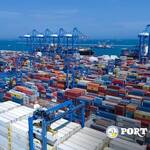The Integrated Customs Management System (ICUMS) has significantly transformed trade facilitation in Ghana, making the process more efficient and seamless.
According to Mr. Samuel Akrofi, Customs Revenue Officer and Acting Head of the Ghana Customs Laboratory, Customs Division of the Ghana Revenue Authority (GRA), ICUMS has automated many processes that were previously manual, reducing human interference and increasing efficiency.
Speaking on “Eye on Port”, a weekly Television Magazine programme of the Ghana Ports and Harbours Authority (GPHA), Mr. Akrofi emphasized that ICUMS has played a crucial role in reducing delays and ensuring a more transparent customs process.
“So, the ICUMS has been able to help us move most of our operations that used to be manual to more automated systems, reducing human interfaces,” he stated.
Enhancing security while facilitating trade
He noted that ICUMS was an update of existing systems, indicating that Customs started off with manual, moved to automated systems for customs data, and the Ghana Customs Management System.
Mr. Akrofi explained that ICUMS is an evolution of past customs management systems, integrating various security and trade facilitation elements.
He said all the challenges encountered during the implementation of the systems had been corrected in the ICUMS.
Unlike its predecessors, he said ICUMS nearly impossible for anybody to falsify documents, and more efficient during scrutinising documents and facilitating the trade process.
Furthermore, the integration of scanning technologies such as x-ray systems, GAMA systems, trans-infrared spectroscopy, field Raman spectroscopy, and backscatter systems has enabled Customs to conduct non-intrusive inspections.
These advanced technologies allow officers to examine consignments beyond the surface, improving security while ensuring swift clearance of goods.
The system uses more scanners to do non-intrusive inspections, making use of x-ray systems, GAMA systems, trans infrared spectroscopy, field Raman spectroscopy equipment, and backscatter systems to be able to see beyond the surface to get a better understanding of the consignment.
Collaboration with State Agencies for Efficient Clearance
ICUMS is not only transforming customs processes but also fostering inter-agency collaboration.
All relevant state agencies have access to the system, enabling them to participate in joint inspections and share real-time information.
“Customs sits on a goldmine of intelligence,” Mr. Akrofi revealed.
“We have information on exporters, originating countries, and destinations, which we share with state security and intelligence agencies.”
To strengthen these collaborations, Customs engages in joint training programmes, technical committee meetings, and coordinated enforcement actions.
These efforts ensure that trade facilitation does not come at the expense of national security.
Encouraging compliance through a tiered system
ICUMS also incentivizes traders to comply with customs regulations through a tiered system that categorizes importers based on their track record.
Mr. Akrofi explained that traders are assigned to different channels based on their compliance history.
This comprises red Channel where traders requiring stringent checks, Yellow Channel-traders who have demonstrated compliance and require moderate scrutiny, Green Channel-highly compliant traders who undergo minimal checks and Blue Channel-trusted traders whose goods are released even before arrival at the port.
By providing incentives for compliance, Customs aims to build trust with the trading community, ensuring a smoother and more efficient process for all stakeholders.
Economic growth through efficient trade facilitation
The impact of ICUMS on Ghana’s economy cannot be overstated.
By streamlining customs procedures, reducing clearance times, and minimizing human interference, the system has helped create a more business-friendly environment.
Faster clearance of goods means reduced costs for businesses, improved cash flow, and increased competitiveness for Ghanaian traders on the global stage.
Additionally, by reducing opportunities for corruption and smuggling, ICUMS enhances revenue collection for the government.
These additional funds can be reinvested in infrastructure, social services, and economic development initiatives, further boosting Ghana’s overall economic growth.
A future of innovation and efficiency
Looking ahead, Customs is committed to further innovation and continuous improvement of the ICUMS platform.
Mr. Akrofi noted that the agency will continue leveraging technology to remove bottlenecks in the trade value chain, making Ghana a preferred trade destination in the region.
With ICUMS at the forefront of trade facilitation, Ghana is well-positioned to enhance its economic potential, foster international trade relationships, and drive sustainable growth for years to come.
AfCFTA and Trade Harmonization
Touching on the African Continental Free Trade Area (AfCFTA), Mr. Akrofi noted that Ghana is working towards harmonizing trade processes.
He emphasized that standardizing trade procedures would enable Customs to verify the true origin of goods arriving in the country, ensuring that they come from a legitimate African source.
He highlighted that Africa, as a regional bloc, must trade among itself to grow its industries and become a formidable force in the global economy.
He explained that AfCFTA promotes quota-free and duty-free movement of goods among African nations, with the Certificate of Origin serving as a key document to prevent unauthorized transshipment.
Mr. Akrofi stated that Ghana supports the electronic certification of the Certificate of Origin, ensuring that all goods traded under AfCFTA are verified digitally.
This innovation, he noted, will prevent non-African goods from infiltrating the system under false pretenses, further strengthening the integrity of the agreement.
- No amnesty for people who resigned from NPP – Kodua - 2 May 2025
- Friday, May 2, 2025 Newspaper Headlines - 2 May 2025
- Workers roar over living wage, CJ’s removal, dismissals, pensions others - 2 May 2025




